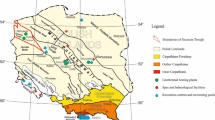Abstract
The current state of exploitation of low-potential thermal waters of the East Ciscaucasia Artesian Basin has been evaluated. Low-potential waters, which are the only source of water supply for a considerable number of consumers in the North Caucasus, are being exploited in an extremely inefficient way with at most 20% of the allocated resources being utilized to the fullest extent. Abusive exploitation of the wells resulted in the bogging of large areas around them, depletion of water resources, and deterioration of the latter as a consequence of backflow of low-quality water from adjacent horizons into those being exploited. The quality of the water has drastically deteriorated; in most wells, contaminants, such as arsenic and various organic compounds, have been detected in quantities that considerably exceed the maximum permissible concentrations set for potable water. These thermal waters are not being used for generation of heat and power since their temperature is too low for heat and hot-water supply purpose. However, the resources of low-potential waters are sufficient to solve the problems of heat and hot-water supply and to provide a considerable number of consumers in the region with potable and process water provided that these resources are exploited in a sensible way using new complex technologies. Complex engineering systems comprise a system of heat pump plants in which the low-potential heat of thermal waters is utilized and a chemical treatment plant in which the cooled water is purified from contaminants, thus raising its quality to the potable water standard. The designs and technological parameters of the chemical treatment plants differ depending on the composition and amount of contaminants. The complex systems allow utilization of the product of thermal artesian wells to the fullest possible extent and large-scale introduction of such systems will facilitate the solution of environmental and economic problems in the region and improve sanitary, hygienic, social, and living conditions of people.

Similar content being viewed by others
REFERENCES
A. B. Alkhasov, Geothermal Energy: Problems, Resources, Technologies (Fizmatlit, Moscow, 2008) [in Russian].
G. V. Tomarov, A. I. Nikol’skii, V. N. Semenov, and A. A. Shipkov, Geothermal Energy: Reference and Methodical Guide (Intertekhenergo-Izdat, Moscow, 2015) [in Russian].
M. K. Kurbanov, Geothermal and Hydromineral Resources of Eastern Caucasus and Ciscaucasia (Nauka, Moscow, 2001) [in Russian].
A. B. Alkhasov, M. G. Alishaev, D. A. Alkhasova, A. G. Kaimarazov, and M. M. Ramazanov, Developing Low-Potential Geothermal Heat (Fizmatlit, Moscow, 2012) [in Russian].
Yu. M. Petin, “New generation of thermal pumps for heating and efficiency of their use in Russia,” Perspekt. Energ. 8, 27–38 (2004).
A. B. Alkhasov, “Technologies for the comprehensive exploitation of the geothermal resources of the North Caucasus Region,” Therm. Eng. 65, 151–154 (2018). https://doi.org/10.1134/S0040601518030023
Author information
Authors and Affiliations
Corresponding author
Additional information
Translated by O. Lotova
Rights and permissions
About this article
Cite this article
Alkhasov, A.B., Alkhasova, D.A. Comprehensive Utilization of Low-Potential Geothermal Waters of Southern Russia for Heat and Water Supply and Solution of Environmental Problems. Therm. Eng. 66, 361–366 (2019). https://doi.org/10.1134/S004060151905001X
Received:
Revised:
Accepted:
Published:
Issue Date:
DOI: https://doi.org/10.1134/S004060151905001X




